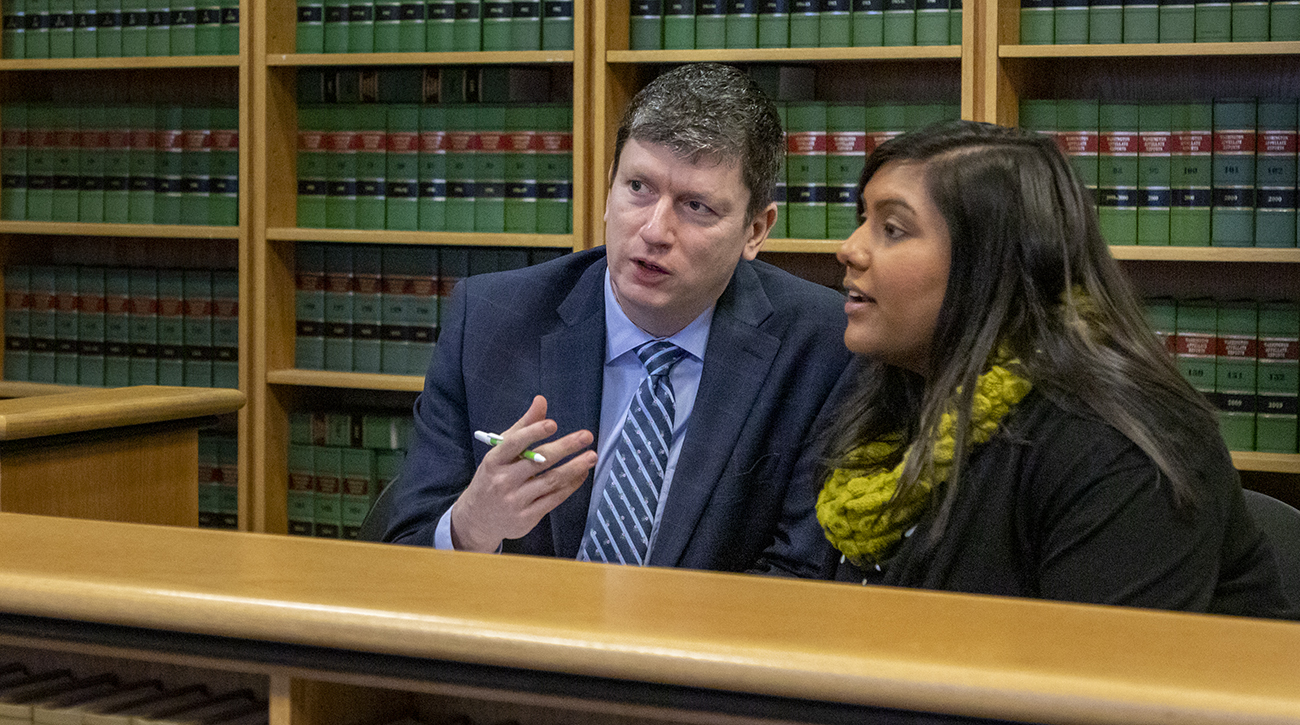Kenneth Barger has an impressive ability to curse in French and Spanish. He also effortlessly translates legal terms into those languages. Both skills are essential to his job.
Barger (BA, French, 2014) is a French and Spanish interpreter and translator, working mostly within the court system to help litigants who have limited proficiency in English. He figures he has spent upwards of 20,000 hours in court over the past 20 years, interpreting court proceedings into French or Spanish and then interpreting the litigant’s responses into English. The cases have ranged from divorces to misdemeanors to serious crimes.
“I love what I do, but it can be dark sometimes,” Barger says.
Barger’s first attempt at learning a foreign language provided no hint of his future potential. He describes his attempts to learn German at Seattle’s Garfield High School as “a spectacular failure.” A videogame buff, he worked in customer service at Nintendo after graduating high school. When the company offered to cover the cost for community college, he sampled a variety of courses at Seattle Central Community College (SCCC), including Spanish. That changed everything.

“I chose Spanish because I was curious about Latino culture,” Barger recalls. “I’m interested in cultures and people, and the course exposed me to this new world. I found it fascinating and couldn’t stop.” Barger took more Spanish courses and signed up for a two-month study abroad in Spain. By the time he returned from Europe he was fluent in Spanish, which led Nintendo to make him a bilingual representative for Spanish-speaking customers, with the job title “Bilingual Advanced Super Agent.”
After several years in that role, Barger passed his first interpreter exams and began working in medical settings, court settings, and for social services agencies. The courts provided the highest pay and best working conditions, so that became his primary focus. He passed an arduous test to become a federally certified court interpreter for Spanish — one of only about 20 in Washington state. “It’s the highest achievement a court interpreter can get,” Barger says. “It allows you to be in federal court and makes you more attractive to attorneys.”
People’s freedom, their right to be heard in a court case — it matters.
Once he reached the top of his field, Barger sought new challenges. He returned to school, this time enrolling at the UW as a French major. He earned his degree in 2014 and soon added French interpreting/translating to his résumé. (Interpreting involves speech; translation involves working with legal documents and other written material.)
Barger estimates that about 60 percent of his work is in Spanish, the other 40 percent in French, mostly with litigants from sub-Saharan Africa. There is a greater demand for Spanish interpreters, but also a larger pool of interpreters. For French, Barger is one of only three certified court interpreters in Washington state. He’s also in demand in Idaho, Oregon, and Alaska, where there are no certified court interpreters for French.
Despite his years of experience, Barger is always learning. “Anything can be litigated, so you have to have a broad vocabulary,” he says. “When I first started working in French as an interpreter, I always tried to get as much information as possible up front and study like crazy to have the necessary vocabulary.”

That vocabulary can range from erudite language to street talk, since preserving an individual’s register — the level of sophistication of their language — is essential for interpreters. “If someone speaks in a very street-colloquial kind of way, to the extent possible you have to reproduce that in a street-colloquial kind of way,” he says. “Particularly in court, people are literally being judged. Their demeanor, the way they express themselves, all of that comes into play.”
Which is why an encyclopedic knowledge of French and Spanish curse words comes in handy. Most litigants are respectful in court, but some let loose with colorful language out of frustration. As an interpreter, Barger must interpret every word. He recalls one case in which the litigant spewed endless insults at the judge. “What he was saying was filthy,” Barger recalls. “There I was, looking very professional in my tie, cussing out the judge for what seemed like an hour.” (It was more like three minutes.)
A more ongoing challenge for Barger is maintaining a professional distance from litigants. Sometimes litigants mistakenly assume the interpreter is part of their defense team, but in fact neutrality is essential — and difficult to maintain. “I’ve gained a lot of knowledge about court, and sometimes I am aware that an attorney is giving a client bad advice,” he says. “I have to interpret it anyway. That’s painful.”
Barger turns to exercise to relieve the stress of his job. One of his go-to activities is skateboarding, a sport he discovered at age 13. His favorite spot in those days was the UW campus — especially the deserted Central Plaza Garage late at night. “That parking garage is like a ski run,” Barger recalls. “I must have skated it a thousand times.” These days he sticks to skate parks.
Then it’s back to work, bridging language barriers.
“It’s important work,” he says. “I feel that what I do is positive. People’s freedom, their right to be heard in a court case — it matters.”
More Stories

Finding Love at the UW
They met and fell in love as UW students. Here, 10 alumni couples share how they met, their favorite spots on campus, and what the UW still means to them.

AI in the Classroom? For Faculty, It's Complicated
Three College of Arts & Sciences professors discuss the impact of AI on their teaching and on student learning. The consensus? It’s complicated.

Bringing Music to Life Through Audio Engineering
UW School of Music alum Andrea Roberts, an audio engineer, has worked with recording artists in a wide range of genres — including Beyoncé.